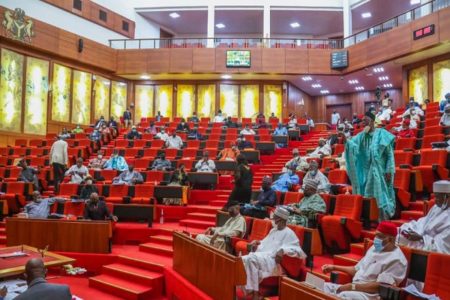Senate on Thursday took a major step to
promote a suitable regulatory and legal environment to support the rapid development of factoring services, which would also contribute towards integrating Nigeria into the global factoring market and enable it tap into €2.6 trillion global factoring market.
The factoring, assignments and receivables financing bill, sponsored by the chairman, Senate Committee on Banking, Insurance and other Financial Institutions, Senator Adetokunbo Abiru (APC Lagos East) scaled second reading on the floor of the Red Chamber.
Senator Abiru, while leading debate on the bill, said it presents one of the best opportunities to introduce something new and impactful into the regulatory environment for MSMEs in Nigeria.
He explained that the bill seeks to create an avenue where interest of contractual rights to payment of a monetary sum by a debtor is transferred by agreement to a third party called the factor, adding that it is a service involving a financial transaction receivables (i.e invoices) to a third party called the factor, with the factor assuming full credit and collection of responsibilities.
“This new means of financing is referred to as debt factoring. Debt factoring is, simply put, the sale of receivables (debt) by one entity (the “Seller”) due from another party (the “Debtor”) to a third party (related or unrelated) (known as the “Factor” or “Purchaser”) at a discounted price for immediate,” he said.
According to him, the passage of the bill will not only promote a suitable regulatory and legal environment to support the rapid development of factoring services, but would also contribute towards integrating Nigeria into the global factoring market and enable it tap into €2.6 trillion global factoring market.
He said: “Despite the increasing prominence of factoring globally and in Africa, Nigeria is yet to tap into this financing mechanism.
“According to the Afreximbank, which is the major promoter of factoring in Africa, the continent accounted for less than 1 per cent of global factoring volumes in 2017.
“The bank also noted that factoring volumes in Africa grew from Euro 14.9 billion in 2009 to approximately Euro 22.3 billion in 2017, with most of those volumes concentrated in South Africa, Tunisia, Morocco, Egypt, Mauritius, and Kenya.
“Enacting this bill into law is a critical step in positioning Nigeria to take advantage of the African factoring market which is above €41.8 billion now and is expected to reach €50 billion by 2025. This would go a long way in closing the trade/MSMEs finance gap in the country,” he stressed.
Senator Abiru added that debt factoring has gained global recognition as a financing mechanism because it helps with improving a company’s cash flows and enhanced credit management.
“It also enables a company to have increased competitiveness in the global marketplace, especially in structured trade finance.
“In Nigeria, for instance, the Central Bank of Nigeria (CBN) recognises debt factoring as one of the permissible activities of finance companies and the Nigerian Export Promotion Council (NEPC) has also introduced factoring and forfeiting as instruments for the financing of export and trade to boost the volumes of export from the country.
“It is for that reason that this bill is being sponsored to create a regulatory framework that would facilitate the development of debt factoring as an alternative means of financing for domestic and international trades in Nigeria and to provide an enabling environment for it to thrive,” he stressed.











